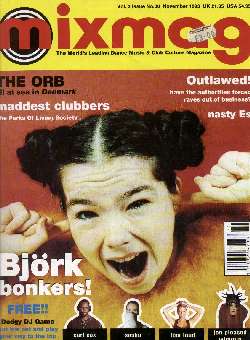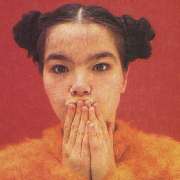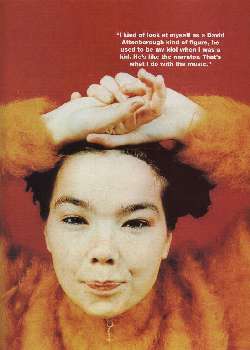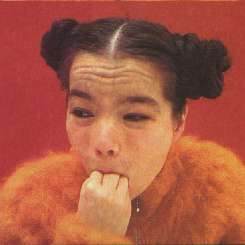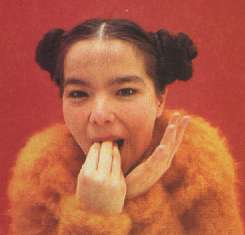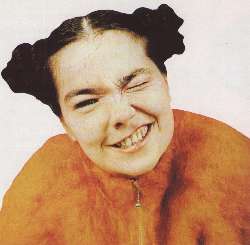Mixmag 11/93
Björkby Dom PhillipsPhotography by Mark McNulty
| |||||
|
"I can just see you" he howls at her, doing the walk again, tucking the imaginary ghetto blaster under his arm. Outside on the stage, here at Arhus in Denmark, arch indie/house exponents Underworld are bewildering the Danes with a blinding set. In the dressing room Ike shouts "Acieed!" Björk giggles. "He's a jazz musician at a rave," she says. When Björk and her band played London's The Forum in August, impressively staging the inspired genre mix ot her ,Debut' album under a sombre pool of psychedelic lights, a more serious appreciation was the order of the day. Intelligent looking women everywhere mouthed the words, Björkettes - girls with Björk bunches and, incongruously, teddy bears - stood spellbound. Celebrities lingered, everything was green. A small Icelandic girl in a long white dress kicked off her shoes, put the wildest voice through a few thousand spines and magic descended. So backstage herein cold Denmark, I wasn't expecting impressions. But now Tansay the percussionist is opening and shutting the dressing room door, which is raising and lowering the volume in time to Underworld's music. "Remix! Remix!" everyone shouts. Leila, Björk's ebullient keyboard player, rushes in raving about Underworld. "It's harsh orchestrated techno," she enthuses. Björk cracks open another bottle of Champagne and there's every reason to celebrate. In Arhus, as in London, both gigs were long sold out, both suddenly the hot ticket ot the week. Here and in England, despite no major chart hits and little radio play, people know enough about Björk to get excited. They know that Björk's ,Debut' album 15 out there on its own - way, way ahead of anything else this year. An eclectic collection ot fiery songs that chucked everything from bhangra and techno to jazz and indie dub into the cooking pot and pulled it together, pulled it ott with a voice that's part torch singer on acid, part Billie Holliday in space. An album that's everything you never heard before but always wanted to. Then let bose the coolest collection ot remixers on every single: Underworld, Speedy J, Bassheads, David Morales, even - whoops! - Mick Hucknall. Avantgarde music heaven with good tunes; totally out there.
And live, those that know ,Debut' find the smooth undercoat of studio bass and drum that album producer Nellee Hooper so beautifully layered is cleverly reconstructed for the stage. Not with DATs and miming, but with living people. Ike might be a jazz musician, but he can handle the rolling house bassline on ,Violently Happy' like the most effident of Computers. The set trips through 20 minutes of moodier songs. Then enough already of the slow stuff! There's a strobe and a big bass drum and suddenly Björk's band are careering through live house music while that spine tingling voice lets lose. This is the part the Danes, less familiar with the album, really go tor. Two encores later, Björk leaves the stage to uproar.
Björk, Talvin tells me, is a "good band leader", having subtly solved an extra loud bass problem from the soundcheck without upsetting anyone. Leila recalls her own call to arms, an answering machine message in Stoke in Björk's bizarre cockney-lost-in-lceland accent. "Wembley Stadium [supporting U2] was the second ever gig I played," she tells me proudly. "I wouldn't play for anyone else." Björk smiles through it all. Everything is "tops." She goes outside to watch Underworld and clenches her fist; she loves them. At 2am the minibus heads back to the hotel in good spirits. "When I wrote the album I didn't think of doing it live," Björk later confesses. "But the two ways of doing it were just having tapes and DATs and sequencers and just me, or doing it live and consciously trying to create a new sound. I kind of went for that." And not surprisingly succeeded. I'd watched the soundcheck, six musicians on a big black stage and Björk in the middle, a small figure never seeming to tell anyone what to do but somehow completely in control, completely self assured. At one point she walked out into the empty hall where one sad Danish hippy was tying flowers to everything that didn't move. Björk faced the stage and sang in the middle of the echoing, empty venue while an automatic lighting truck buzzed its way around her. Festival volunteers glanced quizzically as they walked past with their dinners on paper plates.The hippy wiggled and smiled. No one looked, but everyone, out the corner of their eyes, was very aware she was there.
"I kind of look at myself as a David Attenborough kind of figure, he used to be my idol when I was a kid. He's like the narrator. That's what I do with the music, l'm such a fan of all the sounds and notes and everything, I could step out of my singing. That's probably what David Attenborough would like to do, just get people there and watch the snails have sexual intercourse, or whatever they do on nature programmes. Introduce the two together, the audience and the animals, or what I do, the audience and the music." This interview with the David Attenborough of modern music nearly didn't happen. Björk, over-exposed in a thin eight months, has gone from producing the most exciting music this year to being a full blown personality and phenomenon. Gamely gone through a media feeding frenzy of photos, Interviews, six thousand questions about her childhood and worse - everyone wants a bite of Björk and we're down to the core already. TV and teen mags are involved, and Björk being "a bit different," has become "you are a bit strange, really, aren't you?" It had to end in tears and it did. A Danish TV Interview has been cancelled as has a trip to Italy tomorrow to do fashion photos. They tried to cancel me but I was already on the plane. Björk's record Company, One Little indian, know they've got a hot property on their hands, she's in tears and suddenly they are scared. "The other day my record company got a bit protective," understates Björk, "you probably felt it." So here we are, me and Björk, having breakfast in a plush, green and leather bar, at Arhus's regal Hotel Royal. She has wet hair, a long black skirt this morning, a small, neat suitcase on a trolley and she asks the waiter, very politely, if it is possible to have toast. "I would be very happy if I could make my music in the same sense as," she says with her mouth full, "a biologist doing research. Scientists, whatever, or inventors. Something. Probably my favourite people. Not having to explain it because it's like ridiculous, really." Björk drinks her coffee. , "Because in a way, there's nothing more to it than the music. That's where all the magic is and the messages, and all the creation." Plus, in Björk's case, the Björk. lt doesn't matter how much she tries to paint herself as the passive presenter, what hangs this breathtakingly eclectic collection of sound together is the highly personal voice that brought the whole thing together. Maybe, Björk argues, steering it back to the music, the music, the music, people just wanted something a bit different. "I liked a little bit of pop, a little bit ot jazz, a little bit ot electronic, a little bit of techno, and that's what I was picking from," she reasons. "It just really, really surprised me that so many people were looking for the same thing. That's the only way I can picture it." That's why, say, she brought in Black Dog to join her Underground Techno Roll Of Remix Honour, and remix the brass-and-voice-only ,Anchor Song'. Brilliant! "I'm obsessed. I think they're tops. A lot ot my friends don't get what l'm on about," she says. "I just think it's got character and a sense ot in-div-id-ual-ity which a lot ot music in general hasn't got." It's her taste, after all, her own very harsh sense of individuality that the whole Björk shaboodle hangs on and that evervone who likes it responds to. One slightly extreme, totally original personality pouring out her heart, her obsessions - that's what evervone is hearing and when they hear it, Björk is who they see. A total package. That's why the media have gone mad and also why the interviews get a little intense. "It's very hard for me to do it superficially," she says, "I tend to take it a bit personally." It's not that Björk isn't very much her own very strong woman and it's not that she's a child. It's just that she retains the complete lack of self consciousness that makes children so powerful - they feel like it, they do lt, they say lt. Like Björk; she sits, gestures and moves in sudden, often childlike impulses, like she's just thought of it. It's not a stage show to her, it's not singing, it's not showing off - it's just part of the flow. It's what you do. It's just her. "If someone would consider what I do a performance I would feel I didn't do a good show," she says, crucially. "it's just the way I look at things."
We knew Björk was something more, something quite special when The Sugarcubes released 'It's - It', a remix album with people like Justin Robertson and Tony Humphries dramatically reinventing their finer moments like ,Birthday' and ,Leash Called Love'. And we realised just how good that voice sounded with a house beat. Björk liked the resulting album, the rest ot the band apparently didn't. But The Sugarcubes split up and Björk ended up in Los Angeles where she met and fell in love with a Bristol DJ called Dom T (it stands for Thrup), who was living out there. A longtime friend ot Massive Attack and Smith & Mighty, Dom had left Bristol in a blaze of glory to take up residency at London's The Wag, then moved on to DJ in LA around the same time as his friend Nellee Hooper. lt was Hooper who contributed largely to the early sound of Soul II Soul, and Hooper who co-wrote and produced 'Debut'. When Dom met Björk he knew nothing about The Sugarcubes. "I just thought, who's this wild and wonderful lcelandic girl," he recalls. "She's like she is. She doesn't put on a show for anybody." And as he was DJing regularly in Los Angeles, "we went out and partied and got into the tunes everyone else was into," he says. "She's always been into dance music, her taste in music is very, very wide, she's into a lot of different styles." Björk herself says she could have made her album ten years ago, but she knew, she'd had warnings from The Sugarcubes days, that there'd be a hype, that it would become "about her" not "about the music". Recording started in secret and five songs were at the demo stage before her manager Derek Beckett, who also owns her record company One Little Indian, even knew work was in progress. "She has always wanted to do her own album," Dom explains. "Be in control and make her own music. I kind of realised that pretty quickly." Dom, who describes him self as a "Nellee Hooper protege", now has his own blossoming remix career, working with Nellee Hooper programmer Marius De Vries. Already behind him are funky recreations on Lena Fiagbe and De La Soul, and he contributed to 'Debut'. "I knew it was going to be a great album," he grins. One reason they've moved to London with Björk's seven year old son Sindri is to help develop that. He DJs at celebrity hang-out Browns and varius one-offs and hopes he and Björk will be working together on their new home studio.
Iceland, an old school friend of Björk's tells me, is an "extreme" place. Björk grew up a solitary and, until her teens, imaginative child, "running around in a tiny little crooked forest, going between my parents [her father heads Iceland's electricians union], everything very sort of hippy-ish, playing Jimi Hendrix and everything painted purple, then running towards my grandparents, very sort ot conservative jazz lovers," she says. And she remembers that she "liked paper a lot and different cardboards and I would tear them to pieces and whatever came out would be pictures and I would make little worlds." And once, says Björk, she spent a whole day making one of these paper worlds, a huge, special paper world. "I'd fallen in love with this girl in school, I was six, and I took it to her. And I'd never talked to her before. She kind ot rolled it apart and it was just a lot ot torn pieces of paper with nothing written on them. I just suddeniy realised it wasn't that brilliant, just rubbish really. She just laughed really hard and threw it in the dustbin." Björk laughs. "It's a sad story." Of course there was music everywhere, with ten different hippies queueing up for the record player and everything played full volume, "on, like, ten." With no hint of irony, Björk reveals she didn't rebel until the grand old age of seven, when she stormed the home stereo with a copy of Sparks' seminal 'This Town Ain't Big Enough For The Both Of Us'. "The hippies didn't really like it, they thought it was too Pop, it didn't have cred, they thought it was too comical, and that was the first time I was like 'I've got a record and I'm going to play it and now you've all got to listen to what I like.'" Since then Björk's been music mad, her voice is properly trained. lt is her obsession and she verges on trainspotter status. She's happiest talking about Black Dog or the italian soundtrack music of Nino Rosa, or Darren Emerson, her favourite DJ, "he's hard but always organic." Even though Dom is the DJ with ten year's experience behind him, at home in London's Little Venice it's Björk who dominates the record player. "I guess I'm addicted to music and it's hard to me not to have music around," Björk decides. "When I was touring with The Sugarcubes I had a little ghetto blaster, a very little one, and all my pockets full of tapes. For every occasion there's a song. Just if underneath what we're doing now -" she gestures round the room full of heavy wood and green leather, "- would be some Richard Clayderman." Björk would sit on the band bus and listen. "People would be talking, a certain atmosphere, and I would put that tape on and see what happened." What a wind-up. Imagine sharing a 16 hour bus ride with someone who kept subtly steering the conversation with her background music. "It's a shame elevator music has got that title," she muses, "It's lost evervone's respect. You should have music for Interviews, music for train rides. Music doesn't have to want all your attention, not at all. I think music is even stronger when it's unconscious."
"I think there's a picture in everybody's head of what is ordinary - It's just like a model," she argues. "You've got standards for so many things, for your typical business meeting, your typical rock concert, your typical meal, your typical love affair, your typlcal marriage, your typical wife. But it doesn't exist really. It's all very personal and all very up to you really." Everyone sees things differentiy, in other words. But with Björk's lyrics, you can almost feel you're getting inside her head. You can nearly feel the textures of her thoughts. She puts them there for you. She elaborates, starts talking about an imaginary day, where everything typical isn't quite and the weather affects your mood and the DJ plays a record which makes another part of your mood - and how it's all totally untypical really. I can almost understand. "Things aren't ordinary," Björk concludes. "They aren't. They're supposed to be. But they aren't." It's time to go. "Just say, Underworld were tops," she says as I snap pictures of her finishing breakfast. Björk goes off to join the band on the tour bus; tomorrow they're playing a festival in Belgium. It's a 12 hour bus ride. With Björk. And, no doubt, her ghetto blaster.
BJÖRK
| |||||
